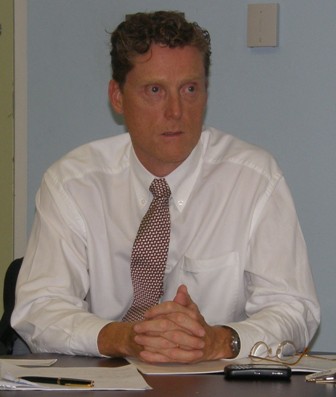Archive for July, 2009

The bubble has burst
Our Government has borrowed $190 million to make up for this year’s shortfall in Public Revenue. It’s a useful stopgap measure, but it won’t last long – and it probably can’t be repeated. Borrowed money has to be repaid, and government is already up to its neck in debt-repayment obligations.
Public Revenue may never again be as high as it was last year – except in devalued currency, which is a topic for another day. Our bubble has burst, and the boom may be gone forever. Our new rulers have inherited a bloated government payroll, counting all the various bloated agencies, bloated corporations and bloated departments. At least a hundred million dollars are paid to employees each year in unnecessary posts created to service the politics of vanity.
For year after year, until a few months ago, Public Revenue provided far more money than was needed for essential government services. The excess was regularly frittered away on empire-building, to the point where one must question the basic capabilities of those individuals who strive for authority over this little borough. Can we afford to keep electing mere populists, time after time?
Self-indulgence has been the norm. Financial prudence was dismissed as unsuitable for the richest islands in the region. Like some crazed lottery-winner, the custodians of the Public Purse adopted the philosophy of “Spend, spend, spend”. Not any more. Will next year’s Public Revenue – and the following year’s, and the one after that’s – provide enough to service our Public Debt, after paying for all government operations? Enough to keep giving free medical care to all government workers and their families till death do them part? Enough to pay the staggeringly generous Civil Service and MLAs’ pensions for the rest of the pensioners’ lives and their spouses’?
Three options
Until the last few years, government pensioners made no contributions at all towards their own pensions. There wasn’t even a Pensions Fund. The pensions were unfunded – secured only by promises to pay them out of each year’s Public Revenue. In effect, new pensioners were (and are) paid from the contributions of the current crop of taxpayers. Such a scheme can only stay alive while an economy is expanding. Like any Ponzi scheme, it is doomed the minute the economy begins to shrink.
Now, our economy is shrinking, and so is the likelihood that the promises can be kept. Lawyers may argue that the promises are not binding; accountants know very well that they should have been included in the Public Debt figures anyway, and properly provided for. In this situation, our rulers’ choices are limited to three options, each of which is a vote-loser.
1) Cut some Civil Service pensions and medical benefits, in order to free up money for normal operating expenses.
2) Fire some employees. (About two thirds of current Public Expenditure goes on wages and benefits.)
3) Raise taxes and user-fees.
Increasing the tax burden is the worst of the three because that would shrink the economy even further as well as raise prices for all local consumers. So that should be pretty much a non-starter. A major factor is the reluctance of our politicians to grasp the other two nettles. They won’t accept that the current reach of our government has become hugely over-extended, and that some programs just can’t be maintained. They seem to believe that the boom times will be back very soon and that the trend of Public Revenues will revert to the norm of the past decades, so that there will be no need for prudence ever again.
Boondoggles
But it’s not likely to happen. Instead, they have to cut their expenditure – no ifs, ands or buts. It’s just a matter of where it’s cut, how much is cut, and who is fired. We are faced with political triage. Some voters might want to start by eliminating some of the smaller inessential programs. The work of the Investment Bureau and Government Information Service couldbe done far cheaper by the private sector, and better. Pageants and festivals could be organized by volunteers, as they used to be.
Freedom of Information and Human Rights are wonderful dreams, but in the absence of any political commitment from either Cayman or London there is no point in spending any money on them. Some voters might prefer to tackle some of the large and inessential bureaucracies first. If the state’s payroll has to be cut by a thousand or so in order to balance the budget, there just aren’t enough small programs to make a significant difference.
There is no good reason for government to spend money on advertising Cayman’s tourism facilities. The private sector can do it better and cheaper. The Department of Tourism and its agencies are plain old boondoggles. The whole empire should come off government’s books, including Cayman Airways. The Turtle Farm and Pedro’s Castle are also parts of the DOT empire. There is no good economic reason for them to be owned by government, or for a penny of Public Revenue to be spent on salaries, pensions and medical benefits for the people who work there.
Our government can’t pay for all its present commitments unless Public Revenue miraculously recovers to its boom levels; and unless US tourists suddenly recover their confidence in their own fortunes; and unless the high-tax nations suddenly abandon their war against tax-havens.
Until that day comes, if it ever does, our rulers must cut their coat according to their cloth. This is one crisis they are not going to be able to muddle through.

Jury says “Guilty”
 (CNS): The jury took just over five hours to find William Martinez-McLaughlin guilty of the murder of Brian Rankine-Carter. The court heard the foreman deliver his verdict at 5:25pm on 20 July, having been sent to deliberate at a little after 12 noon. The defendant remained impassive as the verdict was read to the court and as the mandatory life sentence was handed down by Justice Alex Henderson. The lead detective on the case, Detective Chief Inspector Peter Kennett, said the defendant had been convicted on irrefutable evidence.
(CNS): The jury took just over five hours to find William Martinez-McLaughlin guilty of the murder of Brian Rankine-Carter. The court heard the foreman deliver his verdict at 5:25pm on 20 July, having been sent to deliberate at a little after 12 noon. The defendant remained impassive as the verdict was read to the court and as the mandatory life sentence was handed down by Justice Alex Henderson. The lead detective on the case, Detective Chief Inspector Peter Kennett, said the defendant had been convicted on irrefutable evidence.
“William McLaughlin-Martinez has been convicted on significant and irrefutable evidence for the vicious murder of Brian Rankine-Carter,” said Peter Kennett. “There were certain issues raised during the trial concerning police procedures and these will be subject to a review. Our thoughts go to Brian’s family at this time and hope the verdict can bring some closure to their distress.”
The brutal murder took place in McField Lane, George Town, on 16 May 2008 when the naked and mutilated body of Rankine was discovered in a parking lot. According to the pathologist’s testimony, the murderer had administered 48 injuries to the victim with a machete and something akin to an ice-pick. The murder weapon was never recovered, however the Crown put together a case based on witness testimony from Jason Hinds, who was with McLaughlin on the night of the murder and who has been charged with accessory after the fact, and forensic evidence.
During the trial the court heard that there were a number of questions regarding the integrity of evidence in police custody including items that had not been properly processed, as well as evidence that had actually gone missing.

Broken water main in Bodden Town
(CNS): The Water Authority say there is a broken water main in Bodden Town near Mostyn’s Gas Station. The water will be turned off at 5:30pm and will effect customers in the area of Manse Rd to Gun Square. All customers east of Gun Square will still have water, however at a reduced pressure. The Water-Operations crew is diligently working to identify the exact location of the leak. Once the leak is identified, repairs are estimated at 4hours. All motorists are ask to avoid this area where possible. For those motorist who can’t avoid the area, they are asked to proceed with caution and obey all road signs.

Death not swine flu says HSA
 (CNS): Updated 21 July 7:30 am –– The death of a 31-year old Caymanian man, who was residing at Caribbean Haven, the government’s substance abuse treatment centre, caused a floury of activity by Health officials yesterday when the possibility of the death being caused by swine flu was raised. However, it was confirmed that the patient was likely to have died as a result of other causes when a locally administered influenza A test came up negative. HSA officials said the test has about a 90% accuracy rate; however, samples were sent to CAREC in Trinidad for further testing.
(CNS): Updated 21 July 7:30 am –– The death of a 31-year old Caymanian man, who was residing at Caribbean Haven, the government’s substance abuse treatment centre, caused a floury of activity by Health officials yesterday when the possibility of the death being caused by swine flu was raised. However, it was confirmed that the patient was likely to have died as a result of other causes when a locally administered influenza A test came up negative. HSA officials said the test has about a 90% accuracy rate; however, samples were sent to CAREC in Trinidad for further testing.
Health Services Medical Director Dr Greg Hoeksema said the HSA is continuing to establish the actual cause of the man’s death and that heath visitors would be seeing residents and staff at Caribbean Haven yesterday evening. Mark Scotland, the Minister of Health encouraged everyone to continue following the Health Services Authority’s widely publicised guidelines to prevent the spread of the flu virus. “We have every confidence in the National Influenza Pandemic Committee, in the contingency plan, and in the measures which have already been so purposefully implemented,” he added. “I ask residents to heed public health advisories and to stay informed. The Cayman Islands National Influenza Pandemic Committee will continue to monitor the situation and adjust the country’s response accordingly.
There have been at least 49 confirmed cases of the novel H1N1 09 flu virus or swine flu on the islands but in each case, with one exception all patients have had only mild symptoms and recovered without complications. Only one patient who has since recovered was hospitalized for treatment.

Investigation of GT shooting continues
(CNS): Two weeks after the shooting death of Omar Samuels in McField Lane, detectives carried out a canvassing exercise of the area in an effort to encourage people to pass information to police. On Saturday night, 18 July, twelve officers from the investigation team attended the location on the same day of the week and at the same time of the shooting to speak with people in the area who may have been present on the night of the shooting.
“The area is quite busy after midnight on Saturday’s and we wanted to reach anyone who may have been there on the night of Omar’s death,” said Detective Inspector Kim Evans who is leading the investigation.
Omar Samuels was found on McField Lane in the early hours of the morning, 5 July, suffering from a gunshot wound. A post mortem was carried out on Sunday, 12 July, which showed Samuels suffered a single gunshot to his leg which penetrated the Femoral Artery. A Major Incident Room continues to operate from George Town police station.
“The exercise was quite beneficial, but we are convinced there are people who were present that night who know more than they have told us,” said Evans. “These people need to really think about what they know and about passing it on. A man lost his life and we need to find out what happened.”
Evans stressed that if people do not feel comfortable talking to the investigation team directly, there are a number of other ways people can communicate. “You could call Crime Stoppers, which is answered overseas, you could speak to an officer you know or you could call the voicemail service,” said Evans.
The RCIPS has still not commented on the response time of the emergency services to the shooting of Samuels, though police have said it was impacted by the need to wait for an armed response unit to check the scene before the ambulance was cleared to enter. Evans has said an armed response unit was on the scene within 10 minutes of the 911 call. However, he did not say how long it then took for the ambulance to reach the victim, who, according to reports, bled to death.
Persons with information can use the following ways to pass it on:
Detective Inspector Kim Evans – 925-6761 or 925-7240
Crime Stoppers – 800 8477 (TIPS)
Voicemail facility – 949-7777

Jury retires in murder trial
 (CNS): At around 12:10 today (Monday 20 July) Justice Alex Henderson sent the jury to deliberate their decision in the trial of William Martinez-McLaughlin (centre) for the murder of Brian Rankine-Carter. Following his review of the evidence and law in the case, he noted that the charge against Martinez-McLaughlin is for one count of murder and the jury will need to return a unanimous verdict to the court. The judge emphasised the need for the jury to be absolutely sure that the Crown had proved the defendant had administered the fatal blows to Rankine if they were to return a guilty verdict, and if there was any doubt they must return a verdict of not guilty.
(CNS): At around 12:10 today (Monday 20 July) Justice Alex Henderson sent the jury to deliberate their decision in the trial of William Martinez-McLaughlin (centre) for the murder of Brian Rankine-Carter. Following his review of the evidence and law in the case, he noted that the charge against Martinez-McLaughlin is for one count of murder and the jury will need to return a unanimous verdict to the court. The judge emphasised the need for the jury to be absolutely sure that the Crown had proved the defendant had administered the fatal blows to Rankine if they were to return a guilty verdict, and if there was any doubt they must return a verdict of not guilty.
He said the Crown had not offered the option that Jason Hinds, the Crown’s principal’s witness, had committed the offence with the defendant and therefore the only verdict they could bring was against McLaughlin-Martinez.
The judge directed the jury to weigh all the evidence and consider the possible bias of Hinds, the motivations for his testimony and the possibility that he has lied, as well as the plausibility of it. He noted that there were indications that Hinds had lied, and why he may have done so. Henderson also pointed out the Crown’s suggestion that he had incriminated himself and that his evidence accords with police testimony.
He reminded the jury that suggestions made by the defence that a police office had conspired to help Jason Hinds was not evidence as the officer had not admitted to any collusion. Henderson directed the jury that the police errors or mistakes had only a narrow reference for them and it was not for them to decide how the police should have conducted the enquiry or how they could improve. The judge made the point that it was merely the absence of results regarding misplaced or missing evidence that may make the jurors less sure of guilt.
Focusing on the importance of the forensic evidence, he highlighted the fact that blood matching the deceased had been found on the principal witness’s boots as well as his clothes, which he had hidden but later led police to where they were buried.
Justice Henderson said that the DNA and blood had also appeared onthe defendant’s boots, wallet and belt and that his cap had been found at the scene of the murder under the victim’s left foot. He also noted that a blood spatter expert had indicated that the defendant had to have been very close to the deceased to get the stains on his boots and the boots had walked in a pool of blood.
The judge said the cap was a major point for the jury’s consideration as no explanation had been offered and they needed to consider for themselves how it ended up under the deceased foot.

Marijuana use stirs debate
 (New York Times): IT was as if she woke up one day and decades of her life had disappeared. Joyce, 52 and a writer in Manhattan, started smoking pot when she was 15, and for years it was a pleasant escape, a calming protective cloud. Then it became an obsession, something she needed to get through the day. She found herself hiding her addiction from her family, friends and co-workers. “I would come home from work, close my door, have my bong, my food, my music and my dog, and I wouldn’t see another person until I went to work the next day,” said Joyce.
(New York Times): IT was as if she woke up one day and decades of her life had disappeared. Joyce, 52 and a writer in Manhattan, started smoking pot when she was 15, and for years it was a pleasant escape, a calming protective cloud. Then it became an obsession, something she needed to get through the day. She found herself hiding her addiction from her family, friends and co-workers. “I would come home from work, close my door, have my bong, my food, my music and my dog, and I wouldn’t see another person until I went to work the next day,” said Joyce.

Asylum for Saudi princess
 (Independent): A Saudi Arabian princess who had an illegitimate child with a British man has secretly been granted asylum in this country after she claimed she would face the death penalty if she were forced to return home. The young woman, who has been granted anonymity by the courts, won her claim for refugee status after telling a judge that her adulterous affair made her liable to death by stoning. Her case is one of a small number of claims for asylum brought by citizens of Saudi Arabia which are not openly acknowledged by either government.
(Independent): A Saudi Arabian princess who had an illegitimate child with a British man has secretly been granted asylum in this country after she claimed she would face the death penalty if she were forced to return home. The young woman, who has been granted anonymity by the courts, won her claim for refugee status after telling a judge that her adulterous affair made her liable to death by stoning. Her case is one of a small number of claims for asylum brought by citizens of Saudi Arabia which are not openly acknowledged by either government.

Information security lapses revealed
 (CNS): Following a damning report by the Office of the Complaints Commissioner highlighting the lack of proper procedure in the disposal of electronic data by government entities, the Computer Services Department (CSD) has announced that it has formalised the procedures by which it disposes of desktop and laptop hard drives. The OCC’s Own Motion Investigation into the use and disposal of electronic data storage containers (EDSCs), which might include sensitive information or personal details, found that none of the chief officers of the ministries or portfolios, who have the legal responsibility to see that the data is disposed of appropriately, were doing so.
(CNS): Following a damning report by the Office of the Complaints Commissioner highlighting the lack of proper procedure in the disposal of electronic data by government entities, the Computer Services Department (CSD) has announced that it has formalised the procedures by which it disposes of desktop and laptop hard drives. The OCC’s Own Motion Investigation into the use and disposal of electronic data storage containers (EDSCs), which might include sensitive information or personal details, found that none of the chief officers of the ministries or portfolios, who have the legal responsibility to see that the data is disposed of appropriately, were doing so.
The report uncovered a careless attitude towards data within government: “For less than $50, a person can buy an 8GB jump drive, which is more than enough memory to save all the word-processing files typically handled by a civil servant in a year. Yet it is not uncommon for these jump drives to go missing. They are small and often treated with no greater concern than a pen or pencil carried away from the office. The OCC has witnessed jump drives tossed into vehicles, purses and gym bags.”
The OCC report launched in January of this year and tabled in the Legislative Assembly this month, also found several instances of negligence on the part of various government entities that could potentially have resulted in sensitive information passing into the wrong hands. For example, computers from the Portfolio of Internal and External Affairs that had been donated to the prison’s educational programme could not be verified as being wiped; a private local charity had received computers from another government entity that still contained government files; and government machines with storage capacity had wound up in the Red Cross Thrift Shop.
The OCC investigated the managing and disposing of a range of electronic EDSCs, such as disks, diskettes, CDs, DVDs, UBS thumb drives, tapes, smart cards, plus scanner, photocopier, camera and fax machine memory chips and PDAs, as well as computer hard drives. While all the ministries and portfolios and their departments, with the exception of the Department of Tourism and the Department of Education Services, said they relied on CSD to dispose of their IT equipment, CSD noted in the report that it seldom actually received the EDSCs back from the various departments once the department had recommended that those items be condemned, and that not all Blackberries were brought to CSD when taken out of service.
The OCChad concluded: “With the introduction of this enhanced practice of monitoring and secure disposal of EDSCs, there will be a need for all civil servants to be made aware of the importance of properly securing maintaining and disposing of EDSCs.”
The statement issued by CSD said an increased number of government agencies are now using the department, government’s central information technology agency, to dispose of hard drives at standards that meet or exceed recommendations by the US Department of Defense (DOD). CSD noted that each agency has the right to choose how it disposes of assets, although CSD does provide recommendations on information technology (IT) disposal. In all cases condemnation requests can only be made once a department is certain of its compliance with the National Archive and Public Records Law 2007 that governs public sector records management.
Director of Computer Services, Gilbert McLaughlin Sr, noted that CSD also physically destroys hard drives as part of the disposal process. This is routinely done in the case of the central computer servers that store the bulk of government’s information, and which CSD own. Where devices are reused, McLaughlin observed that securely cleaning storage devices can be extremely time consuming, depending on the security level that must be met. For this reason there is a need to assign varying security levels to all data on such devices, and prioritise their disposal accordingly, the release said.
Work is already ongoing to develop government-wide policies covering the use, security, storage, and disposal of EDSCs, based on the classification of the types of information stored on them, the release said. As an example, such policies will require laptops storing data that is sensitive or private to be encrypted and disposed of in the manner appropriate to the security level of the information. By contrast, a desktop computer used as a public kiosk (such as a public-access PC in a library) might remain unencrypted and be disposed of in a secure, but less exacting, manner. CSD will also be exploring the feasibility of more environmentally friendly disposal options in conjunction with the Department of Environmental Health.
“In conclusion, CSD – and its parent agency, the Cabinet Office – reassures the public that positive steps are already being taken to create comprehensive, secure disposal processes for government-owned data storage devices. They will continue to inform the public of developments in this important area, as they occur,” the CSD stated.
In its report, however, the OCC also pointed out that electronic data is also accessed remotely, which further complicates the issue.
“Even when the user is accessing information over the internet or using a thumb drive, an image of the file they are working on is transferred to their computer or whatever computer they are working on. While these images are not easily accessible using standard methods of file retrieval once the token or thumb drive is removed or the internet connection is broken, the information is still on the computer. If a person that wishes to retrieve that information was able to gain access to the hard drive they could, with relatively inexpensive software … access those documents,” the OCC report stated.

Speed and agility camp
 (CNS): All boys and girls ages 8-19 are invited to participate in a free camp organized by track and field Olympian Kareem Streete-Thompson at the Truman Bodden Sports Complex from Tuesday, 21 July, through Friday, 24 July. This activity is intended to aid participants in all sports to improve their quickness, flexibility and movement in response to varying situations. Sessions are scheduled to begin promptly at 9:00am each morning and continue until 12 noon. Registration will be conducted each day from 8:30 to 8:55am. Parents and guardians of participants under age 18 are requested to accompany their children to registration.
(CNS): All boys and girls ages 8-19 are invited to participate in a free camp organized by track and field Olympian Kareem Streete-Thompson at the Truman Bodden Sports Complex from Tuesday, 21 July, through Friday, 24 July. This activity is intended to aid participants in all sports to improve their quickness, flexibility and movement in response to varying situations. Sessions are scheduled to begin promptly at 9:00am each morning and continue until 12 noon. Registration will be conducted each day from 8:30 to 8:55am. Parents and guardians of participants under age 18 are requested to accompany their children to registration.
Included in the staff are coaches from NCAA Division I 2009 National Champions, the
Florida State University Seminoles-Jackie Richards, Harlis Meadors, and Dave Plettl. Also assisting will be Cayman Islands national record holder in the hammer, discus and weight throws, Michael Letterlough. Olympic hurdler Ronald Forbes is also expected to make appearances.
Appropriate dress and footwear for strenuous activity is a requirement. Spiked shoes will
NOT be utilized. Hydration refreshments will be provided.
Further information is available at kaystreete@gmail.com or at 345-924-1110 or 945-3970.